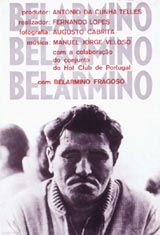Belarmino
Belarmino is a 1964 docufiction. It charts the life and times of exboxer Belarmino Fragoso. It is one of the first films of the Portuguese Cinema Novo, itself part of a wave of New Cinemas sweeping the world in the 1960s, and a break from the previous tradition of Portuguese cinema exemplified by the comdia portuguesa. Lopess film was shown at the festivals of Pesaro and SalsoPoretta in Italy, garnered favourable reviews throughout Europe and won the Prmio da Casa da Imprensa back in Portugal.
The Experiential Strand is principally concerned with registering Fragosos current and former activities. After the opening credits, in which we see a montage of stills of Belarmino taken in the streets of Lisbon, there follows a sequence showing the exboxer at a training session in his former boxing club. We are shown scenes of the daily domestic routine of Fragoso and his wife at their home in the Rua Barros Queirs, which seems at once both fragile and tranquil. We later see them eating at a casa de pasto with their daughter. We also see footage shot at the Grupo Desportivo da Mouraria, a small neighbourhood association where Belarmino first began to box and where he met the man who was to manage him for the most part of his career Albano Martins. Here youths who are presumably the next generation of hopeful boxers train against a backdrop filled with the paraphernalia of traditional neighbourhood life.In the next section, which concentrates on Belarminos life in the streets, we see the exboxer walking along his home street and through Lisbons downtown. He approaches a young woman to her obvious displeasure. Later, Belarmino sits on an esplanade, drinking coffee and whistling, partly at women passersby and partly to himself. We again see Belarmino training, this time outside on the track of Sporting Clube de Portugals old Alvalade stadium. This sequence is juxtaposed with a return to the boxer walking through the streets of the Baixa. He passes by one of the old cinemas of that area, which has posters for westerns and horror films pasted on its doors. The camera accompanies Belarmino through the midst of a great number of people who seem to be milling around aimlessly. As Belarmino moves through the streets, we hear not atmospheric noise but the sounds of a screening in a cinema auditorium. At one point there is a tiltup of the faade of the Cinema Eden, which shows us Belarminos view of a poster announcing the film A Mida da Bica showing its lead, Fernando Farinh
Source: Wikipedia

